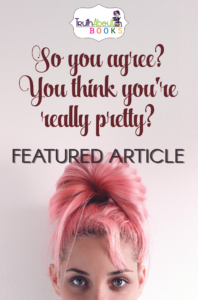
In 2015, 18-year-old blogger Gweneth Batemen conducted a personal experiment: when men on social media complimented her on her appearance she would acknowledge that what they said was true. The men would usually revoke the compliment as if Batemen’s confirmation somehow voided the fact that she was physically attractive. Whether she was polite or snarky to the people in question, the replies were the same: the men would retract their compliment as if her being attractive was something they could and give or take away depending on whether they liked her response.
A lot of readers saw exactly what was going on: these guys were acting like they were the gatekeepers of Batemen’s beauty and validity. And why shouldn’t they? That’s how it works according to our culture. Young women are often conditioned to take whatever affirmation or validation they’re handed rather than building up their own. That’s why, in Mean Girls, it threw Regina George for such a loop when Cady Heron responded, “Thank you,” to a complement, resulting in the line, “So, you agree? You think you’re really pretty?”
Mean Girls is just the tip of the iceberg when it comes to the phenomenon. Other movies, TV shows, songs, and yes, even books reinforce the idea that young women have to be perceived beautiful before they can see it in themselves, especially is the perceiver is a love interest.
We all know the cliché: a shy bookish girl sees herself as plain, unattractive and uninteresting no matter what anyone around her says. Then her potential boyfriend shows up and helps her see how beautiful and wonderful she really is, triggering a boost in confidence, which is usually followed by a makeover. It’s either that or the protagonist simply doesn’t care about her appearance at all.
There seems to be a shortage of healthy middle ground: female protagonists who actually see themselves as beautiful before prince charming shows up or learn it on their own through the course of the book. They’re definitely out there—Rose from Vampire Academy and Sophie from Howl’s Moving Castle come to mind—but I’d say they’re definitely a minority.
I understand that seeing yourself as beautiful can be hard. Growing up I was a chubby girl with frizzy hair, a crossed eye and think bushy eyebrows, so trust me. I get it. It’s something a lot of girls and women struggle with, but what really sounds like it would have a more positive impact on readers: a girl who looks like them who has to be told she’s pretty by a boy who doesn’t exist, or a girl who looks like them and validates her features on her own as she kicks butt and saves the day?
Personally, I like the second better. I wish I had seen more stories like that growing up. It’s something to model yourself after instead of something to chase. We don’t just need characters that look like us, we need characters we want to imitate. I would rather imitate someone who sees herself as beautiful and worthy to be heard and seen, with or without a love interest, than someone who constantly needs it from an outside source. I’m not saying outside validation and compliments are bad, but they should be icing on the cake. We should strive for more than compliments. We should strive for confidence in ourselves and we should encourage others to do the same, even with characters if your craft so requires.
So, to all the writers out there, I encourage you to perform your own experiments. Write girls who love themselves. Write girls who learn to love and validate themselves through their own strength and the help of people other than their potential boyfriends. Give them flaws other than insecurity about their appearance and low self-esteem as you give them admirable strengths. Readers, pay attention to stories with these characters and share them with your friends. Encourage each other and encourage yourself because, whether your real-life prince shows up or not, at the end of the day we’re all we’ve really got.
All Mean Girls-related material copyrighted by Paramount Pictures. Image originally hosted on billboard.com
Editor’s Note: Featured on Cheap Reads by our Senior Reviewer, Tay Laroi


YES. YES. YES. This needs to be read by every author!
Doesn’t it though! Thanks for your comment.